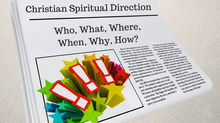One More Moment: Part 3, How Will I Ever Get Out of This Labyrinth?

In his novel, Looking for Alaska, John Green describes a realization many experience when someone very dear to us has died or when we have lost something of great importance, such as a job, a pet, a home, a career, our health, a valued possession and/or trust in others to name a few examples:
“That is the fear: I have lost something important, and I cannot find it, and I need it. It is fear like if someone lost his glasses and went to the glasses store and they told him that the world had run out of glasses and he would just have to do without” (Green, 2012).
This fear shakes us to our core. There is emptiness; a deep longing that may be described as “the feeling of reaching for someone who has always been there, only to find that when we need them one more time, they are no longer there” (James and Friedman, 2009). For some, the hardest thing to bear is this longing for one more moment and fearing that there will be no more moments.
Also very difficult is the fear of forgetting. The protagonist in Looking for Alaska, Miles “Pudge” Halter, laments: “Someday no one will remember that she ever existed...Because memories fall apart, too. And then you’re left with nothing, left not even with a ghost but with its shadow. In the beginning, she had haunted me, haunted my dreams, but even now, just weeks later, she was slipping away, falling apart in my memory and everyone else’s, dying again” (Green, 2012).
While the physical relationship may be over, the spiritual and emotional relationship never ends. In these contexts, there can be many more moments, with love and memories serving as the foundation on which these moments rest.
In his moving tribute to his daughter, Gayle, and his family’s grief recovery following her death in a mass shooting at Northern Illinois University on April 11, 2008, Joesph Dubowski, writes: “People who have lost a loved one can appreciate the need to remember them and the desire that the world doesn’t forget them. Sometimes it’s what gets us out of bed in the morning. And few things brought greater hope and joy to Laurel [Mr. Duboski’s wife] and me than someone letting us know they thought of Gayle, too. An anecdote could brighten our whole day” (Dubowski, 2010).
These moments can act as bread crumbs that when followed can help grievers find their way out of their labyrinths of grief.
The Grief Recovery Method® offers a roadmap out of the labyrinth. In a safe and confidential environment and with the assistance of an experienced guide, you will learn how to examine the losses in your life and to discover what was left unsaid or undone and what expectations or dreams were left unrealized. Discovering these unexpressed emotional communications and sharing them allows you to bring your pain and sad feelings to the surface and to let them go, while still retaining cherished memories. By taking these actions, your heart and head will work together to show you the way out of your labyrinth of grief.
Please call me. I can help.
Dubowski, J. Cartwheels in the Rain: Finding Faith in the Wake of the Unthinkable, 2010. DPI Books: Spring Hill, Tennessee.
Green J. Looking for Alaska, 2012. Speak, Penquin Group, Inc.: New York.
James, J. W. and Friedman, R. 2009. The Grief Recovery Handbook (20th Anniversary Expanded Edition). Collings Living, New York, NY.
© Ekteleo Ministry, 2015. All Rights Reserved.






























